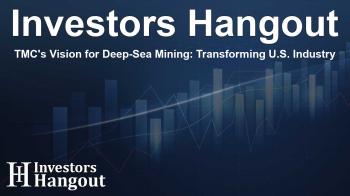TMC's Vision for Deep-Sea Mining: Transforming U.S. Industry

TMC's Impactful Hearing on Deep-Sea Mining
The Metals Company Inc. (NASDAQ: TMC), led by CEO Gerard Barron, recently took center stage during a significant testimony before Congress, focusing on the transformative potential of deep-sea mining. Barron's appearance before the House Committee on Natural Resources comes amid growing interest in the economic benefits and resource opportunities linked to deep-seabed minerals.
Significance of Deep-Sea Minerals
During the hearing, Barron passionately articulated the importance of polymetallic nodules found on the seafloor, which can drastically enhance the supply of critical minerals. These minerals are vital for infrastructure projects, defense manufacturing, and advanced technologies while also pushing the U.S. towards a more self-sufficient energy future. By harnessing the potential of these resources, the U.S. can rejuvenate its approach to industrialization, particularly in sectors like shipbuilding and mineral processing.
Policy Recommendations
Barron urged lawmakers to consider policies that would facilitate the responsible extraction of these resources, emphasizing that the existing regulatory framework, established even as early as the late 1980s, is well-suited to guide the industry while ensuring environmental protection. This framework not only promotes economic growth but also aligns with international laws, allowing the U.S. to lead in sustainable mining practices globally.
Industry Leadership and Job Creation
Barron's testimony underscored a critical message: the U.S. must reclaim its status as a leader in mineral production. He noted that by tapping into the vast resources of the deep seabed, the nation could potentially create over 100,000 jobs and contribute more than $300 billion to the economy. The vision is not merely about economic gain, but also about fostering a new generation of engineers and scientists who can pioneer innovative practices in offshore resource utilization.
Addressing Environmental Concerns
In response to prevalent environmental concerns, Barron highlighted that significant misconceptions exist regarding the ecological impacts of deep-sea mining. He referred to his submitted materials, aimed at debunking common myths that often lead to public confusion over the environmental implications of these practices. Barron firmly believes that responsibly conducted deep-sea mining can yield more sustainable outcomes compared to traditional mining operations.
The Role of NOAA
The National Oceanic and Atmospheric Administration (NOAA) plays a pivotal role in regulating deep-sea mining activities, as set out in the Deep Seabed Hard Mineral Resources Act of 1980. The hearing revealed the crucial relationship between regulatory bodies and the mining industry, emphasizing NOAA's commitment to maintaining rigorous standards while enabling the growth of a new sector that could significantly impact the economy.
Innovative Research and Development
As TMC progresses with its exploration, it is dedicated to ongoing research and understanding the environmental and social repercussions of seabed resource extraction. Their commitment to sustainability aims to ensure that the benefits of deep-sea mining extend beyond immediate profits to foster a long-term metal commons that benefits society.
The Future of U.S. Mineral Dependency
The testimony reaffirmed a pressing need for the U.S. to reduce its dependency on foreign sources for critical minerals. Barron lamented the historical decline of domestic mineral production that has left the nation vulnerable. His vision is clear: innovate, rejuvenate, and create a sustainable path forward that builds upon America's rich history as a mining hub.
Conclusion: A Collective Call to Action
The hearing was not just a legislative event; it was a clarion call for collaboration across various sectors. Barron called on all stakeholders, from scientists to business leaders and policymakers, to engage in meaningful dialogue and action towards establishing a sustainable future for U.S. mining and mineral production. The prospects of deep-sea mining are not merely a theoretical discussion but a tangible opportunity for growth and leadership.
Frequently Asked Questions
What is TMC's role in deep-sea mining?
TMC focuses on exploring and developing critical metals from polymetallic nodules found on the ocean floor, contributing to U.S. industrial and energy independence.
Why are polymetallic nodules important?
Polymetallic nodules are rich in vital minerals like nickel, cobalt, and copper, which are essential for various industries, including technology and defense.
What regulatory body oversees deep-sea mining in the U.S.?
NOAA (National Oceanic and Atmospheric Administration) regulates deep-sea mining practices under the Deep Seabed Hard Mineral Resources Act of 1980.
How can deep-sea mining benefit the U.S. economy?
Deep-sea mining has the potential to create over 100,000 jobs and contribute significantly to the U.S. GDP by providing critical minerals domestically.
What are the environmental impacts of deep-sea mining?
TMC is committed to responsible practices and research to mitigate potential environmental impacts while ensuring sustainable mineral production.
About The Author
Contact Henry Turner privately here. Or send an email with ATTN: Henry Turner as the subject to contact@investorshangout.com.
About Investors Hangout
Investors Hangout is a leading online stock forum for financial discussion and learning, offering a wide range of free tools and resources. It draws in traders of all levels, who exchange market knowledge, investigate trading tactics, and keep an eye on industry developments in real time. Featuring financial articles, stock message boards, quotes, charts, company profiles, and live news updates. Through cooperative learning and a wealth of informational resources, it helps users from novices creating their first portfolios to experts honing their techniques. Join Investors Hangout today: https://investorshangout.com/
The content of this article is based on factual, publicly available information and does not represent legal, financial, or investment advice. Investors Hangout does not offer financial advice, and the author is not a licensed financial advisor. Consult a qualified advisor before making any financial or investment decisions based on this article. This article should not be considered advice to purchase, sell, or hold any securities or other investments. If any of the material provided here is inaccurate, please contact us for corrections.

